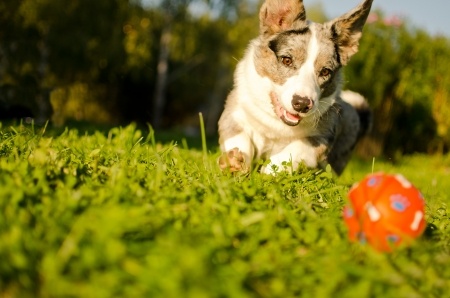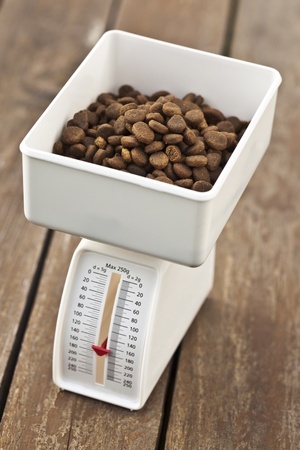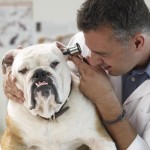
With the arrival of the New Year, we often think about making New Year’s resolutions. From losing weight to exercising more frequently, eating healthier foods or taking better care of our health, most of us set new goals for the coming year. But what about setting some goals that include your dog? Your dog may already have an amazing life, but there’s always some room for improvement. From health to grooming, here are a few New Year’s resolutions for your dog:
Lose Weight
Did you know that over 50% of all pets in the U.S. are classified as overweight? Obesity in dogs is fairly common and unfortunately, can lead to health problems if not addressed early. So a good New Year’s resolution for your dog is to check his weight and see if he’s at a healthy weight. Put your hand flat on his ribs; you should be able to find them without pushing in too hard, but you also shouldn’t see any individual ribs when looking at his side. If you want an accurate measure, you can always take your dog to your vet’s office to be weighed; most vets have a large scale in the front lobby where you can weigh your dog for no charge. If your dog is a bit heavier than normal for his breed and size, you can work with your vet to create a new dietary plan as well as discuss exercise options to help him get back to his ideal weight.
Exercise
Another good New Year’s resolution for your dog may be to increase his level of exercise. Most likely you’d also like to get more exercise, so here’s a great opportunity to include your dog in this plan. Exercise can take many forms – from taking brisk walks together in the neighborhood, going for jogs at a local park or at the beach, or playing ball or fetch in the backyard. Having an exercise partner can be a lot of fun, and most likely your dog is going to be a very willing participant in this goal. Along with the obvious health benefits of exercise, it’s also a great time to bond with your dog. You can use this time to help teach him some basic manners, such as how to walk on a leash, sit or heel. Your dog will enjoy the extra time outside and though it may be tempting to take the same path each time you go for a walk, try mixing up your walks with some new routines. You can find some unfamiliar trails in the local park, go down some new side streets in your neighborhood, or maybe look into some good dog-friendly spots in your area. We all have such busy schedules, but part of your New Year’s resolution for your dog can be to set aside extra time to take walks together, ideally two to three times a day. They may be short walks, but it will feel good to take a few breaks from the regular daily routines.
Grooming
Looking your best is another popular resolution people make each year, so why not include your dog in this resolution as well? Grooming is an important part of your dog’s overall health and can often prevent skin problems; it’s also a great time for one-on-one bonding and spending quality time together. A great New Year’s resolution for your dog would be to brush his coat often, bathe him and clip his nails regularly, too. Grooming your dog is also a good time to check for any bumps or skin abnormalities, scabs, hot spots, etc.
When it comes to our dogs, many of us overlook the importance of good dental care. Your dog’s teeth and gums might be healthy now, but as he gets older he can develop plaque and tartar build up, gingivitis or periodontal disease. You can help prevent dental problems in your dog by brushing his teeth regularly; use a toothbrush made for dogs and special toothpaste which comes in a variety of flavors that dogs like. With a little practice, this extra care will go a long way in preventing future problems. You can learn more abut proper dog dental care here. Best of all, you’ll feel good about this time together and you’ll notice that your dog is also happier when he is clean and properly groomed.
Nutrition
Here’s another good New Year’s resolution for your dog: make a pledge to provide your dog with the best quality nutrition available. Spend some time researching different ingredients in dog foods and compare the different brands; read reviews and gather information from reputable online sources, talk to your veterinarian and also ask your local pet food store what they recommend. You should also customize your dog’s diet based on his age, size and activity level. Growing puppies have very specific nutrient requirements to make sure their bodies can grow healthy and strong, while senior dogs may have lower energy requirements and may need lower fat/lower calorie diets. Selecting a diet that is tailored specifically to your dog’s individual life stage is a great way to help keep him in good health. Also, avoid over feeding your dog, which can lead to obesity and other health problems. Most of us tend to “eyeball” the amount of kibble we feed to our dog. A better way to feed is to use a measuring cup each time, so that you can properly measure how much food to give your dog at each meal. Also, try to resist those pleading puppy eyes when it comes to table scraps and treats. In most cases, table food is the number one contributor to weight gain in dogs, and can also cause health issues such as diarrhea or pancreatitis. You’ve probably made a New Year’s resolution for yourself to lose some extra pounds, so this is a great time to have your dog be a dieting support partner as well!
Health
Taking better care of your health is probably one of your own resolutions this year, so how about making the same New Year’s resolution for your dog? Most vets agree that adult dogs should have a wellness exam every year, whereas senior dogs could benefit from semi-annual exams. Through routine blood tests and exams, your vet will be able to address and manage medical issues in the early stages, such as diabetes, arthritis or obesity. This is also a good time to make sure your dog is up to date on his vaccinations, along with his flea and heartworm medications. You can also use this time with your veterinarian to discuss any concerns you might have regarding your dog’s weight or diet, or any other issues that have come up since your last appointment.
So from spending more time with your dog, watching his diet and making sure he’s happy and healthy, there are many positive things you can do to celebrate the New Year with your best friend. Do you have any other New Year’s resolutions that you have made for your dog?






Leave a Reply